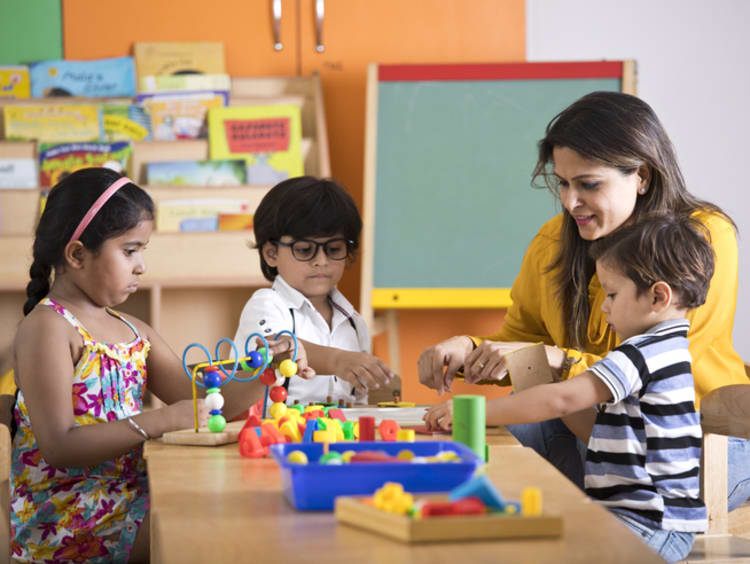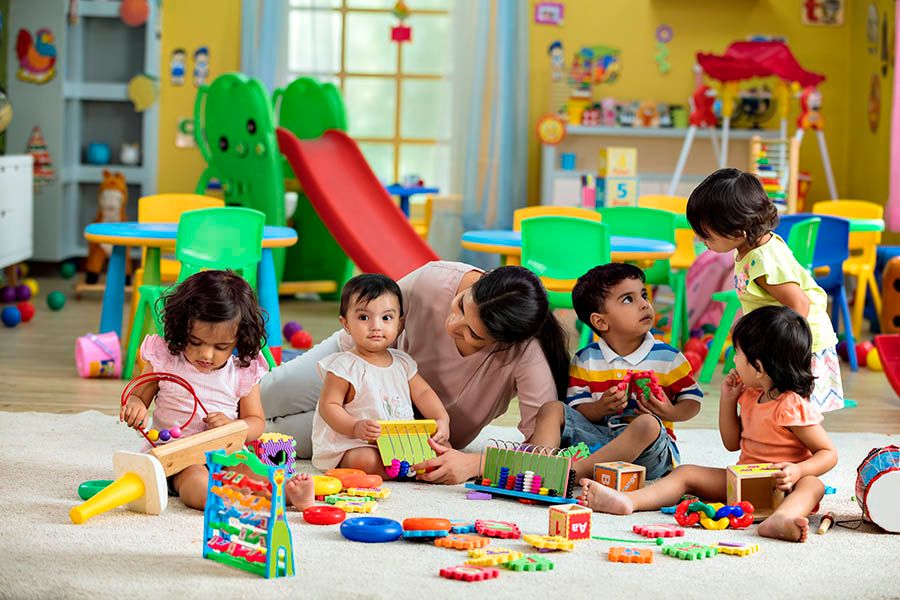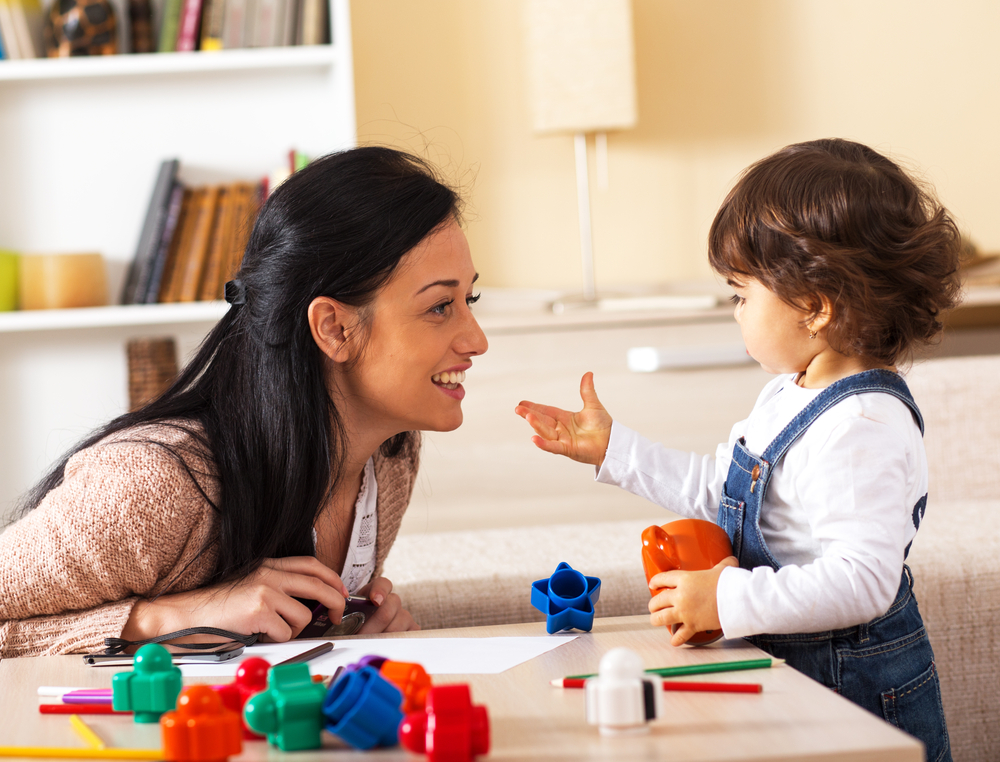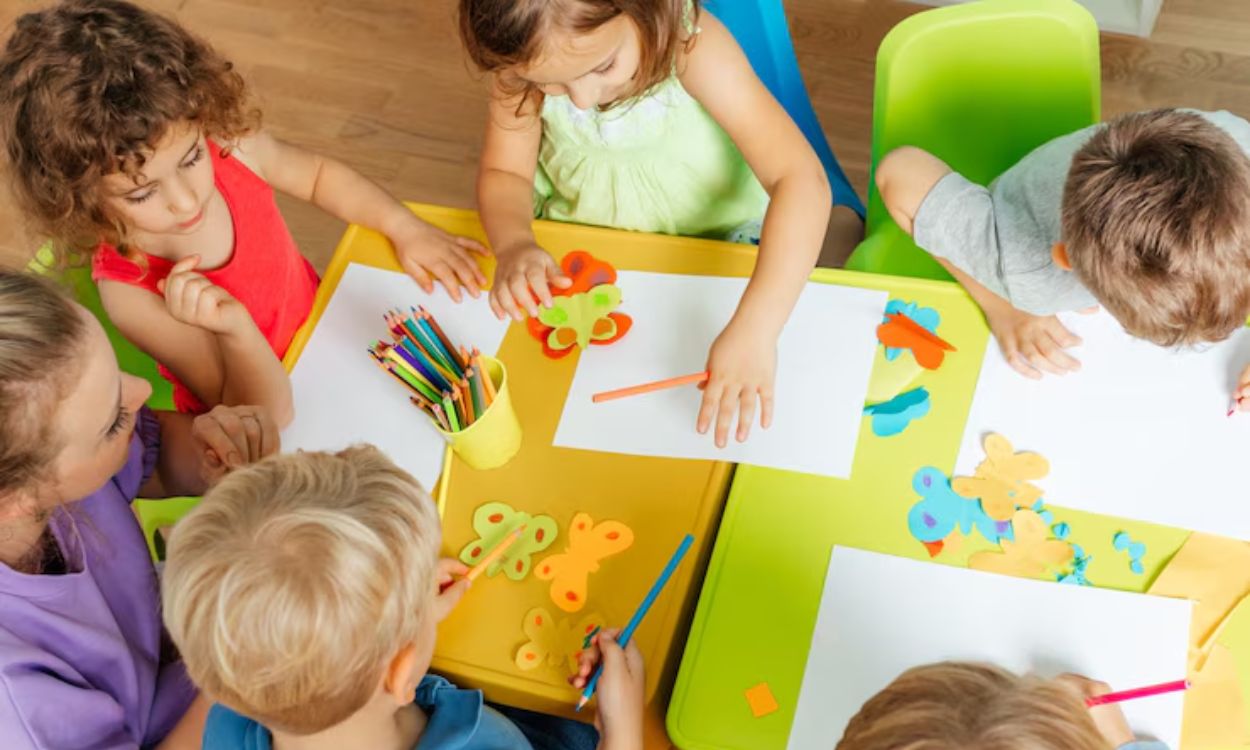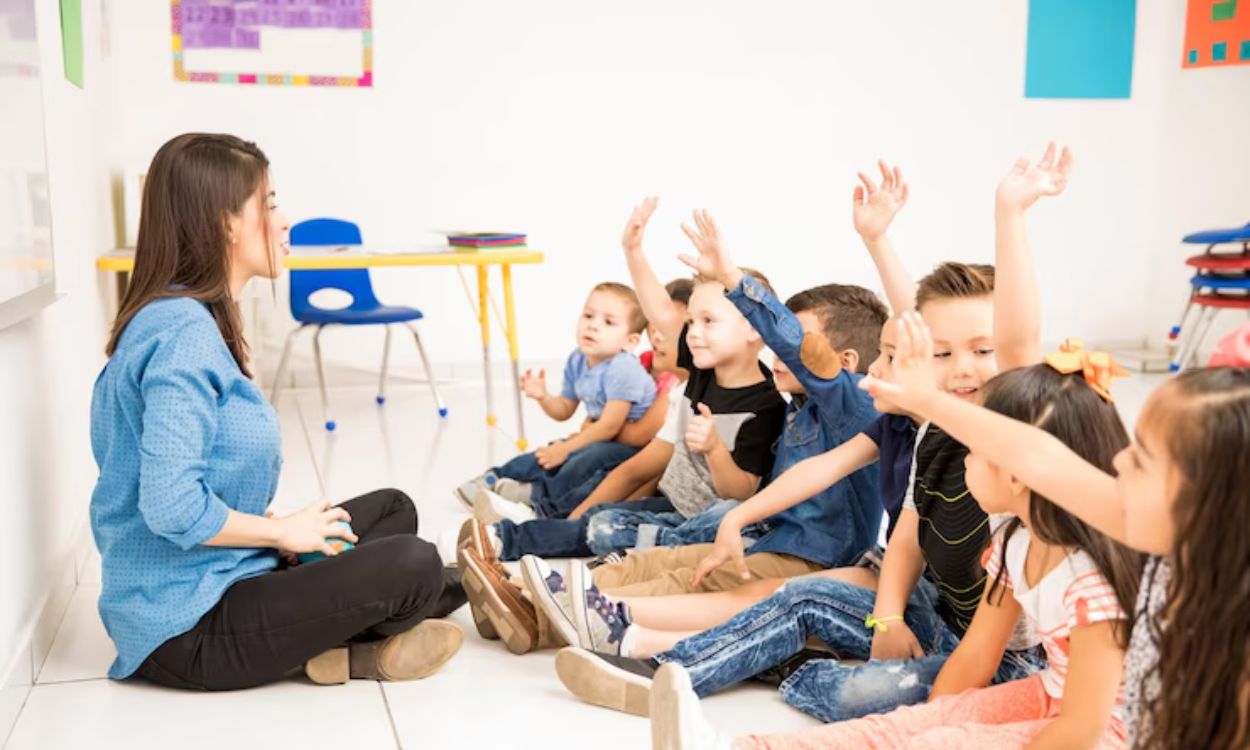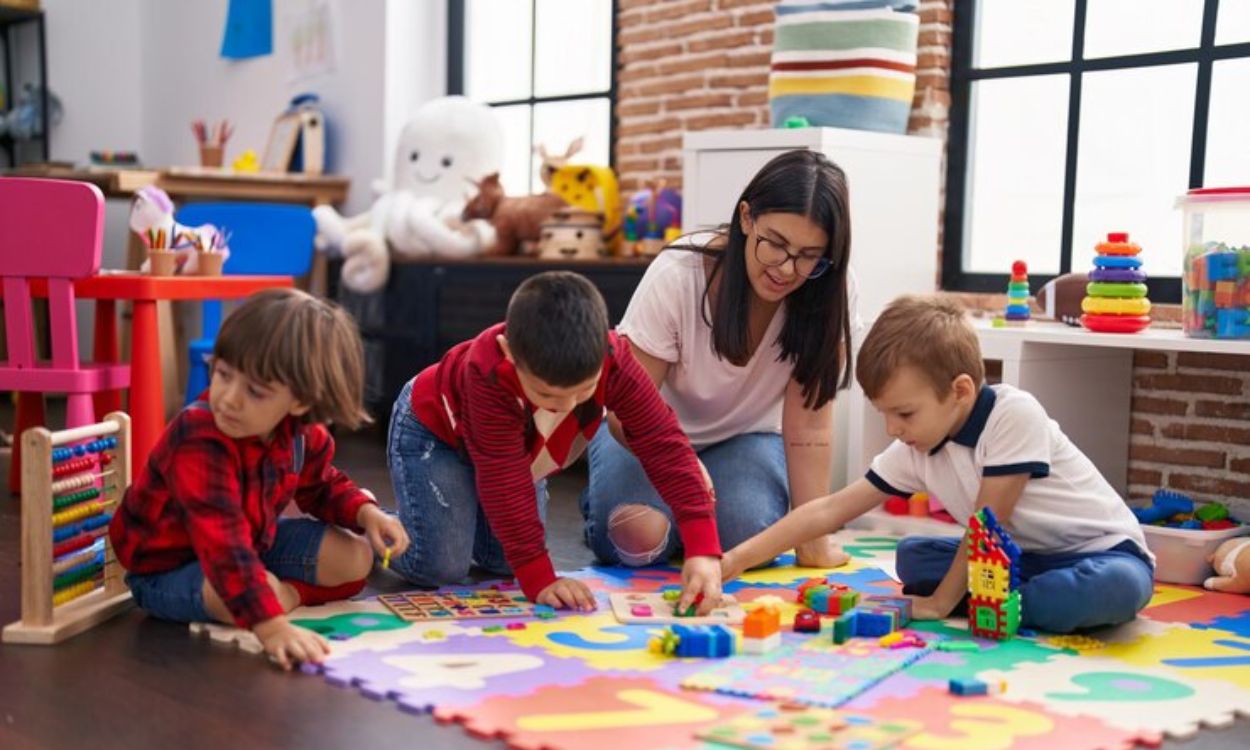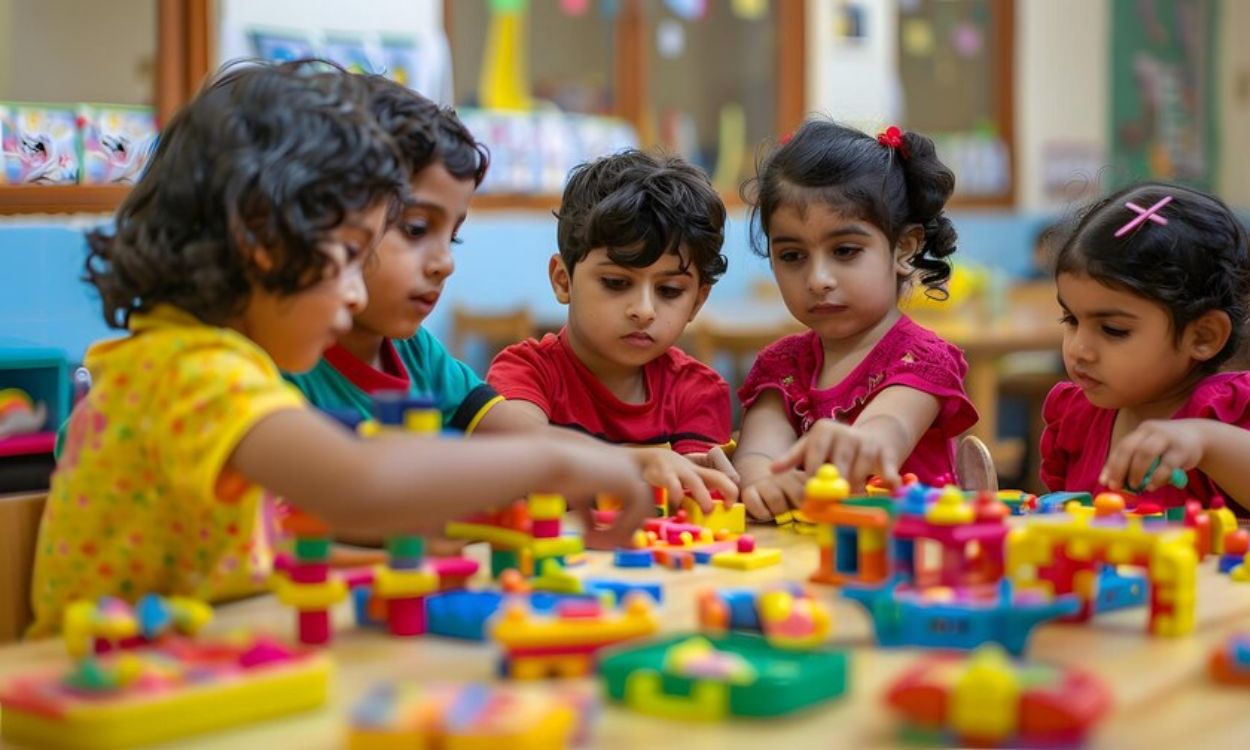Choosing the right preschool is a pivotal decision in a child’s early educational journey. Among the various approaches to early childhood education, the Montessori method has become increasingly popular due to its child-centered philosophy and emphasis on independent learning. Montessori-based preschools are designed to foster a love for learning while focusing on the holistic development of a child. Here’s why montessori based preschool can be the perfect start for your little one. What is the Montessori Method? The Montessori method was developed by Dr. Maria Montessori in the early 1900s and is based on the belief that children learn best when they are free to explore their interests in a structured environment. The approach emphasizes self-directed learning, hands-on activities, and mixed-age classrooms. The goal is to help children develop critical life skills such as independence, problem-solving, and social interaction while encouraging them to take responsibility for their own learning. Key Benefits of Montessori Based Preschools 1. Fosters Independence and Self-Confidence One of the cornerstones of the Montessori method is the focus on independence. In a Montessori classroom, children are encouraged to choose their own activities, work at their own pace, and take responsibility for their actions. This sense of independence helps children build self-confidence as they become more self-reliant. By empowering children to make decisions and manage tasks on their own, Montessori-based preschools give them a strong sense of capability that can last throughout their academic journey. 2. Encourages Hands-On Learning Montessori-based preschools are designed to provide children with hands-on learning experiences that help them understand abstract concepts through concrete actions. From sensory activities that engage sight, touch, and sound, to practical life skills like pouring water or buttoning shirts, the Montessori method allows children to learn by doing. This hands-on approach not only enhances cognitive development but also fosters fine motor skills and a deep sense of accomplishment. 3. Promotes Creativity and Critical Thinking Montessori classrooms are filled with materials and activities that encourage creativity and critical thinking. Rather than rote memorization or passive learning, children are given opportunities to explore, experiment, and discover answers for themselves. For instance, children may use puzzles, building blocks, and other hands-on materials to develop problem-solving skills, while open-ended activities allow them to express their creativity. This type of learning encourages children to think critically and find solutions, which can be beneficial for future academic success. 4. Individualized Learning In a Montessori setting, education is personalized to each child’s needs, interests, and pace of learning. Teachers observe each child closely and provide guidance and resources tailored to their specific developmental stage. Because Montessori classrooms have mixed-age groups, children also have the opportunity to learn from one another. Older children can help younger ones, reinforcing their own knowledge and fostering a sense of community. This individualized approach allows children to thrive academically, emotionally, and socially. 5. Develops Social Skills and Emotional Intelligence While Montessori education focuses on independent learning, it also places great importance on social skills and emotional development. In mixed-age classrooms, children have the opportunity to interact with peers of different ages, which encourages collaboration, sharing, and empathy. Montessori teachers guide children in resolving conflicts and expressing their emotions in healthy ways. This holistic focus on social and emotional intelligence ensures that children not only grow academically but also develop key interpersonal skills. 6. Encourages a Lifelong Love of Learning Perhaps one of the greatest advantages of Montessori-based preschools is that they foster a lifelong love of learning. By encouraging children to follow their natural curiosity, Montessori classrooms make learning fun and engaging. Children are encouraged to explore subjects they are passionate about, and the learning process becomes an enjoyable and intrinsic part of their everyday life. This love of learning often stays with them throughout their academic career and beyond. The Montessori Classroom Environment A Montessori classroom is a thoughtfully designed space that promotes exploration and learning. The environment is carefully organized with age-appropriate materials that children can use independently. These materials are designed to be visually appealing and are often made from natural materials like wood, which helps children connect with the world around them. The classroom is typically divided into areas that focus on practical life skills, sensorial activities, math, language, and cultural studies, ensuring that children receive a well-rounded education. Conclusion Montessori-based preschools offer a unique and enriching educational experience for young children. With a focus on independence, hands-on learning, creativity, and individualized instruction, Montessori classrooms help children develop not only academically but socially and emotionally. The Montessori method encourages children to become active participants in their learning journey, promoting confidence, critical thinking, and a lifelong love of learning. If you are looking for a preschool that provides a well-rounded, nurturing, and child-centered environment, a Montessori-based preschool could be the perfect choice for your little one. By fostering curiosity and empowering children to take control of their learning, Montessori-based preschools lay the foundation for a successful future in both academics and life. TechSix – Preschool & Daycare Excellence TechSix is a leading preschool and daycare dedicated to providing a nurturing, stimulating, and secure environment for young learners. Our curriculum blends structured learning with creative exploration, fostering cognitive, social, and emotional development. With experienced educators, interactive teaching methods, and a focus on early childhood education, we help children build a strong foundation for future success. Our safe and engaging spaces encourage curiosity, confidence, and independence. At TechSix – Preschool & Daycare Excellence, we prioritize holistic growth, ensuring that every child receives personalized attention and care. Enroll your little one today and give them the best start in their learning journey! Preschool Admissions are now open for the 2025-26 Academic Session!! – Enroll Your Kid Now
Why Outdoor Play is Essential for Preschoolers Growth and Development
In the early years of a child’s life, learning and development happen at a rapid pace. While academic learning is crucial, outdoor play is equally important in a preschooler’s growth. Outdoor play offers a wide range of benefits that help in physical, emotional, social, and cognitive development, shaping a child’s overall well-being. 7 Essential Benefits of Outdoor Play for Preschooler’s Growth & Development In this blog post, we’ll explore why outdoor play is essential for preschoolers and how it can help them thrive. 1. Physical Health Benefits of Outdoor Play Preschoolers are naturally full of energy, and outdoor play provides them with the perfect outlet. Running, jumping, climbing, and playing active games help to build strength, improve coordination, and develop fine and gross motor skills. Whether it’s riding a tricycle, playing tag, or swinging on a swing, these activities contribute significantly to muscle development and overall physical fitness. Combatting Sedentary Lifestyles Regular outdoor activities can help combat the sedentary lifestyle that is becoming more common due to the increase in screen time. Being outside encourages children to move and explore, which supports their cardiovascular health, improves bone density, and reduces the risk of childhood obesity. 2. Cognitive Development Through Outdoor Play Outdoor play fosters creativity and problem-solving skills. When preschoolers play outside, they often encounter natural elements like trees, rocks, and dirt. These experiences stimulate their curiosity, allowing them to engage with their environment in new and innovative ways. For example, a child may build a fort out of sticks, learn to navigate uneven terrain, or experiment with water or sand, all of which encourage imaginative play and creative thinking. Critical Thinking and Problem-Solving Additionally, outdoor activities help develop a child’s ability to plan, make decisions, and solve problems. Whether it’s figuring out how to climb a tree, deciding on roles in a group game, or finding a way to balance on a seesaw, outdoor play requires children to think critically and develop problem-solving skills that are valuable throughout life. 3. Social and Emotional Growth Through Outdoor Play Social Skills Development: Interacting with other children in an outdoor setting is an excellent opportunity for preschoolers to build social skills. Group activities like playing games, sharing toys, or building structures together promote teamwork, cooperation, and communication. Children learn to take turns, negotiate, and resolve conflicts in a natural and organic way when playing outside with their peers. Emotional Resilience and Confidence: Outdoor play also has positive effects on emotional development. It allows children to experience a range of emotions, such as excitement, joy, and even frustration, all of which contribute to emotional resilience. By encountering and navigating challenges outside, children learn to cope with failure and gain confidence in their abilities. Additionally, outdoor activities can provide a sense of independence, as preschoolers often feel more in control of their environment when they are allowed to explore and make decisions on their own. 4. Building a Connection with Nature Fostering Environmental Awareness: In today’s digital age, children often spend a considerable amount of time indoors. However, spending time outdoors fosters a strong connection with nature. Preschoolers who spend time exploring parks, gardens, or natural spaces gain a sense of appreciation for the environment. They learn about different plants, animals, and ecosystems, which promotes environmental awareness and responsibility. Mental Health Benefits of Nature: Moreover, outdoor play allows children to benefit from the mental health advantages of nature. Research has shown that spending time in green spaces can reduce stress, improve mood, and increase focus. These benefits help preschoolers feel more calm, centered, and connected to the world around them, contributing to their overall well-being. 5. Enhancing Sensory Skills Through Outdoor Exploration Outdoor environments are rich in sensory experiences that are vital for a preschooler’s development. The natural world offers an array of sights, sounds, smells, and textures that cannot be replicated indoors. For example, children can feel the rough bark of a tree, listen to the chirping of birds, observe the movement of leaves in the wind, and smell the fragrance of flowers. These sensory experiences enhance their ability to process sensory information and improve sensory integration skills. Comprehensive Sensory Development Exploring the outdoors allows preschoolers to practice all five senses, helping them to build stronger connections between what they see, hear, touch, taste, and smell. Sensory play is crucial for brain development and plays an important role in early learning. 6. Improving Attention and Focus Reducing Mental Fatigue: In a world filled with distractions, children’s ability to focus and pay attention is often challenged. However, studies suggest that outdoor play can help improve a child’s attention span and concentration. Spending time in nature or engaging in physical activity can help preschoolers relax and reset, enabling them to return to their indoor activities with better focus. Boosting Cognitive Function: Outdoor play, especially in unstructured settings, helps children develop the ability to focus on tasks, whether it’s completing a puzzle, drawing, or building a sandcastle. Nature’s calming effect helps reduce feelings of anxiety, which can otherwise hinder a child’s ability to focus and engage with tasks. 7. Encouraging Risk-Taking and Confidence Building Outdoor environments provide natural opportunities for preschoolers to engage in calculated risk-taking, which is essential for their development. Climbing a tree, jumping from a height, or balancing on a log might seem risky, but these activities teach children to assess situations, make decisions, and overcome their fears. When preschoolers successfully complete a challenge, they gain confidence in their abilities, fostering a positive sense of self-esteem. Resilience Through Challenge: Learning to manage risk in a safe and supportive environment helps build resilience, perseverance, and a “can-do” attitude—skills that will serve them well throughout their lives. Preschool Admissions are now open for the 2025-26 Academic Session!! Enroll Your Kid Now Conclusion Outdoor play is much more than just fun for preschoolers; it is a critical aspect of their growth and development. From physical health benefits to cognitive, emotional, and social development, outdoor play offers endless opportunities for children to explore, learn, and grow.
Step-by-Step Guide to Preschool Enrollment for Parents
Enrolling your child in preschool is an exciting milestone, but it can also feel overwhelming. With so many options and requirements, parents often find themselves unsure of where to begin. This guide will walk you through each step of the preschool enrollment process, ensuring a smooth and stress-free experience for both you and your child. Step 1: Determine Your Child’s Readiness Before starting the enrollment process, consider whether your child is ready for preschool. Look for signs of readiness such as: Ability to follow simple instructions Basic communication skills Social interaction with peers Independence in basic tasks like eating and using the restroom If your child isn’t quite there yet, you may consider a playgroup or daycare to ease the transition. Step 2: Research Preschools in Your Area Start by making a list of preschools in your area. Consider factors like: Proximity to home or work Curriculum and teaching approach (Montessori, play-based, traditional, etc.) Class size and student-teacher ratio Reputation and parent reviews Extracurricular activities and facilities Narrow down your list based on your child’s needs and your preferences. Step 3: Visit and Evaluate Preschools Once you have a shortlist, schedule visits to the preschools. During your visit: Observe classroom interactions and teacher engagement Check the cleanliness and safety measures Ask about discipline policies and daily routines Speak to other parents if possible Gauge your child’s comfort level in the environment Trust your instincts—if a preschool feels right, it probably is! Step 4: Understand Admission Requirements and Deadlines Each preschool has its own admission process, so it’s crucial to understand the requirements and deadlines. Common requirements include: Age eligibility (typically 2-4 years old) Birth certificate and identification documents Vaccination and medical records Parent interview or child observation session Application fees and tuition structure Keep track of deadlines to avoid missing out on a preferred preschool. Step 5: Complete the Application Process Once you’ve chosen a preschool, fill out the application forms and submit the required documents. Some schools may require: A non-refundable application fee Proof of residence Emergency contact details Special needs or allergy information If there is an interview process, prepare your child by talking about what to expect in a friendly manner. Step 6: Prepare for the Transition After securing a spot, start preparing your child for preschool. Here are a few tips: Talk about preschool positively to build excitement Practice daily routines like waking up early and following schedules Encourage social interactions with other children Read books about starting school Some preschools offer orientation programs—attend them to familiarize your child with the new environment. Step 7: Finalize Fees and Documentation Before the first day, ensure all financial and administrative details are settled. This includes: Paying tuition and other necessary fees Signing consent forms and agreements Understanding school policies on attendance, holidays, and discipline Buying required school supplies and uniforms (if applicable) Step 8: The First Day and Beyond The first day of preschool can be emotional for both parents and children. To ease the transition: Stay positive and reassure your child Keep goodbyes short and confident Establish a goodbye routine (e.g., a hug, high-five, or special handshake) Be patient—some children take longer to adjust than others Communicate regularly with teachers to stay informed about your child’s progress and experiences. Why Choose TechSix – Preschool & Daycare Excellence TechSix stands out as a premier choice for parents seeking a high-quality preschool and daycare experience. Here’s why: Experienced Educators: Our highly trained teachers focus on holistic child development. Innovative Curriculum: A blend of traditional and modern teaching methods ensures a fun and educational experience. Safe & Nurturing Environment: We maintain the highest standards of safety and hygiene to ensure a secure space for your child. Engaging Activities: From art and music to science and physical activities, we provide a well-rounded learning experience. Flexible Programs: We offer full-time and part-time options to suit different schedules and needs. By choosing TechSix, you’re giving your child the best start in their early education journey. Preschool Admissions are now open for the 2025-26 Academic Session! Enroll Your Kid Now! Final Thoughts Preschool enrollment is a big step, but with careful planning, you can make the process seamless and enjoyable. By choosing the right preschool and preparing your child for the transition, you set the stage for a positive early learning experience. Enjoy this new chapter, and trust that your little one is on the path to growth and development! Related:- 5 Myths About Daycare and Preschool Debunked
5 Myths About Daycare and Preschool Debunked
When it comes to early childhood education, many parents find themselves faced with a range of myths and misconceptions about daycare and preschool. Whether it’s concerns about their child’s emotional development or fears of poor academic readiness, these myths can lead to confusion and anxiety. But what if the truth is far from what these myths suggest? Let’s debunk five common myths about daycare and preschool, revealing the valuable role they play in a child’s growth and development. Myth 1: Children in Daycare Don’t Bond with Parents One of the most common concerns parents have is that sending their child to daycare will harm the bond they share. There’s a misconception that daycare disrupts attachment, causing children to form stronger bonds with their caregivers than with their parents. However, this is simply not true. Truth: Children who attend daycare or preschool can still form strong, loving connections with their parents. In fact, spending quality time together at home, engaging in bonding activities after daycare, strengthens the parent-child relationship. Early exposure to social settings, like daycare, actually helps children develop important emotional and social skills, making them more confident and well-adjusted, which ultimately benefits their relationships at home. It’s important to remember that daycare doesn’t replace parental bonding; rather, it complements it. As children learn independence and how to interact with peers and caregivers, they return home with new experiences, which can enhance the bond you share. Myth 2: Daycare and Preschool Hinder Academic Readiness There’s a misconception that children who attend daycare or preschool won’t be as academically prepared for school as children who stay at home. Some parents worry that the focus on play-based learning in daycare environments might prevent their child from developing the academic skills they need. However, this myth overlooks the importance of early learning in a child’s development. Truth: High-quality daycare and preschool programs are designed to prepare children for school, using structured activities that promote cognitive and social skills. Activities such as reading, math games, and problem-solving are integrated into the curriculum, helping children develop essential academic skills in a fun and engaging way. In fact, research shows that children who attend preschool tend to perform better in kindergarten and beyond, as they have had early exposure to literacy, numeracy, and critical thinking skills. Moreover, the social skills children develop in daycare—such as sharing, communication, and working in groups—are just as important for academic success. Preschool prepares children not only for the classroom but for life. Myth 3: Children in Daycare Are Constantly Sick Another myth that often comes up is the belief that children who attend daycare are always sick due to exposure to germs and illnesses. While it’s true that young children in group settings may initially experience more illnesses, this myth tends to be exaggerated. Truth: It’s common for children to catch a cold or other minor illnesses when they start daycare, simply because their immune systems are being exposed to new environments and germs. However, this initial phase is temporary. Over time, children build stronger immune systems, making them more resilient to infections. In fact, research shows that children who attend daycare or preschool are less likely to suffer from more serious illnesses later on in life. What’s more, the benefits of being in daycare go far beyond illness. Children in daycare are exposed to a variety of activities that encourage physical development, such as outdoor play and group games. These activities contribute to a child’s overall well-being and help build their immunity in the long run. Myth 4: Daycare Staff Can’t Provide Individual Attention Many parents worry that daycare providers won’t be able to give their child the individualized care and attention they need, especially if the daycare is large. This myth assumes that children will be just another face in the crowd. However, this is not the case in most reputable daycare centers. Truth: Reputable daycare centers and preschools understand the importance of providing personalized care. They maintain low child-to-teacher ratios, ensuring that each child receives adequate attention. In fact, quality daycare providers focus on creating environments where children feel seen and heard. Staff members are trained to recognize each child’s unique needs, whether it’s for extra encouragement, academic challenges, or emotional support. Daycare and preschool teachers spend time observing and understanding each child, which allows them to tailor activities to suit the child’s developmental stage and interests. This individualized attention fosters a nurturing environment, helping each child thrive at their own pace. Myth 5: Daycare Is Just Babysitting A common myth about daycare is that it’s simply a place where children are “watched” while parents are at work. Some people believe daycare is just about keeping children occupied, without focusing on their development. However, this couldn’t be further from the truth. Truth: Quality daycare and preschool programs are structured learning environments where children engage in activities that promote growth in all areas—cognitive, emotional, social, and physical. These programs aren’t just about babysitting; they are about providing children with age-appropriate educational experiences that foster a love of learning. From reading stories and singing songs to engaging in hands-on activities, preschool is an essential part of a child’s development. The activities offered at daycare are designed to encourage exploration, problem-solving, creativity, and social skills. Through these experiences, children develop the foundation they need for lifelong learning, making daycare and preschool crucial for their development. TechSix – Preschool & Daycare Excellence TechSix is a premier preschool and daycare that blends early education with creativity and care. Committed to nurturing young minds, TechSix focuses on developing essential skills such as cognitive, emotional, and social growth through engaging, hands-on activities. Their dedicated team of educators provides personalized attention, ensuring each child’s unique needs are met. With a safe and stimulating environment, TechSix – Preschool & Daycare Excellence creates a foundation for lifelong learning, making it an ideal choice for parents seeking quality early childhood education and care. Preschool Admissions are now open for the 2025-26 Academic Session! -Enroll Your Kid Now!
How to Choose Between Daycare and Nanny Care?
Ensuring the best care for your child is one of the most important decisions a parent can make. For many families, the choice boils down to two primary options: daycare or nanny care. Each offers unique advantages and challenges, and selecting the right one depends on your family’s needs, schedule, budget, and personal preferences. This guide will explore the essential factors to consider when deciding between daycare and nanny care to help you make an informed choice. Whats is Daycare? Daycare facilities are structured environments where children are cared for in groups. These centers are designed to provide age-appropriate activities, encourage social interaction, and support early learning through a planned curriculum. They often cater to infants, toddlers, and preschoolers, creating an engaging setting for children to thrive. 4 Pros of Daycare Socialization: Daycare promotes interaction with peers, which is vital for developing social skills, teamwork, and communication. Structured Routine: A daycare’s consistent schedule includes set times for meals, naps, and activities, helping children adapt to routines. Qualified Staff: Many daycare centers employ caregivers and educators trained in child development, ensuring a professional approach to your child’s growth. Cost-Effective for Families with Multiple Children: Compared to hiring a nanny, daycare may be a more affordable option, especially if you have more than one child. 3 Cons of Daycare Less Personalized Attention: In a group setting, caregivers divide their attention among multiple children, which may not fully address your child’s individual needs. Fixed Hours: Daycare centers often have strict drop-off and pick-up times, which may be challenging for families with unpredictable schedules. Illness Exposure: Group settings can lead to higher exposure to germs, resulting in more frequent illnesses for children. What is Nanny Care? Nanny care involves hiring an individual to provide in-home care tailored specifically to your child. Nannies offer personalized attention, flexibility, and the comfort of a familiar environment, making this an appealing choice for many families. 4 Pros of Nanny Care Individualized Attention: A nanny can focus entirely on your child’s needs, adapting activities and care to suit their age, personality, and preferences. Flexible Scheduling: Unlike daycare, nannies can adjust their schedules to fit your family’s needs, including evenings, weekends, or irregular hours. Comfort of Home: Children can stay in a familiar environment, which reduces separation anxiety and provides a sense of security. Additional Household Help: Many nannies assist with light household tasks, such as cooking, cleaning, or organizing, making life easier for parents. 4 Cons of Nanny Care Higher Costs: Hiring a nanny, especially an experienced one, is often more expensive than daycare. Limited Peer Interaction: Without other children around, your child may miss out on regular opportunities for social development. Dependence on a Single Caregiver: You’ll need a backup plan if the nanny is unavailable due to illness or other commitments. Time-Intensive Hiring Process: Finding the right nanny involves background checks, interviews, and trial periods, which can be time-consuming. 5 Factors for Choosing Between Daycare & Nanny Care When deciding between daycare and nanny care, consider these important aspects to determine what best suits your family: Budget: Assess your financial situation. For families with multiple children, daycare can be more economical. On the other hand, if you value the personalized attention and additional household support a nanny offers, the higher cost may be worth it. Schedule: If you work irregular hours or require childcare beyond typical daycare operating times, a nanny’s flexibility can be invaluable. However, if your schedule aligns with daycare hours, this option may work just as well. Child’s Needs and Personality: Consider your child’s temperament, age, and specific needs. Infants and toddlers may benefit more from one-on-one care provided by a nanny, while older children might enjoy the social and educational aspects of daycare. Socialization Opportunities: If fostering social development is a priority, daycare is a natural choice. It offers children the chance to interact with peers, practice teamwork, and build friendships in a structured environment. Health and Safety Concerns: For children with allergies, medical conditions, or special needs, a nanny can provide personalized care and attention. In daycare, children are exposed to more germs, which may increase the risk of illnesses, though it can also help build their immune system over time. Making the Decision Choosing between daycare and nanny care is a deeply personal decision that depends on your family’s unique circumstances. To ensure you make the right choice: Research Your Options: Visit local daycare centers to observe their facilities, staff, and programs. If considering a nanny, interview candidates, check references, and conduct thorough background checks. Seek Recommendations: Ask friends, family, or parenting groups for their experiences and trusted suggestions. Hearing about others’ journeys can provide valuable insights. Test Both Options: If possible, try short trial periods with both daycare and nanny care. Observing how your child responds to each setting can help clarify what works best for your family. Trust Your Instincts: Ultimately, you know your child best. Consider all the factors, but trust your intuition when making the final decision. Both daycare and nanny care have their advantages and limitations. The best choice for your family depends on balancing your child’s needs, your schedule, and your budget. With thoughtful consideration and planning, you can find a childcare solution that provides your child with the love, support, and nurturing they need to flourish. TechSix – Preschool & Daycare Excellence TechSix is a premier preschool and daycare center committed to nurturing young minds with care and innovation. Combining a child-centric approach with advanced learning techniques, we provide a safe, stimulating environment where children thrive. Our curriculum blends play-based and structured learning, fostering cognitive, social, and emotional development. With dedicated educators, modern facilities, and a focus on individual growth, TechSix ensures each child embarks on a journey of curiosity and creativity. We prioritize safety, hygiene, and holistic development, making TechSix the trusted choice for parents seeking excellence in early childhood education and care. Preschool Admissions are Now Open for the 2025-26 Academic Session! – Enroll Your Kid Now Wrapping Up Choosing the
Essential Tips to Help Your Child Thrive on Their First Day of Preschool
Starting preschool is a big milestone in both your child’s life and yours. It’s an exciting new chapter that opens doors to learning, socializing, and growing independently. However, it can also come with its fair share of jitters, not just for your little one but for you as well. The good news is that with some thoughtful preparation, you can ease the transition and set the stage for a positive experience. 12 Practical Steps to Help Prepare Your Child for Their First Day of Preschool 1. Talk About Preschool in a Positive Way Start by introducing the concept of preschool as an exciting and fun place. Use phrases like, “You’ll get to make new friends, play games, and learn so many cool things!” to build anticipation. Read books or watch age-appropriate videos about preschool to familiarize them with what to expect. Highlight the fun activities they’ll enjoy, such as storytime, art projects, or outdoor play. 2. Visit the Preschool Together Most preschools offer orientation sessions or open houses before the first day. Take your child along to explore their new environment. Show them the classrooms, playground, and other facilities. Meeting their teacher ahead of time can help create a sense of familiarity, making the first day less daunting. 3. Establish a Routine A predictable daily routine can help your child feel secure and prepared. A week or two before preschool starts, First Day of Pre adjusts its schedule to match the preschool’s timetable. This includes waking up, having meals, and going to bed at consistent times. Practice getting ready in the morning to mimic the flow of a typical preschool day. 4. Encourage Independence Preschool is often the first step toward independence for children. Teach them basic skills such as: Putting on and taking off their shoes. Washing their hands. Using the bathroom independently. Packing and unpacking their backpack. Celebrate their achievements as they master these tasks, boosting their confidence for the big day. 5. Practice Separation Separation anxiety is common for preschoolers. If your child is used to being with you all the time, practice short periods of separation. Start by leaving them with a trusted caregiver or family member for brief intervals. Always assure them that you’ll come back and make sure to follow through. This builds trust and helps them adjust to the idea of being apart during preschool hours. 6. Pack Comfort Items Let your child bring a small comfort item, like a favorite stuffed animal, blanket, or even a family photo. These items can provide a sense of security and familiarity in an unfamiliar environment. Check with the preschool’s policy on such items beforehand. 7. Label Everything From backpacks to water bottles and extra clothes, ensure all your child’s belongings are labeled with their name. This helps both the teachers and your child identify their items, reducing stress and confusion. 8. Create a Goodbye Ritual Develop a consistent goodbye ritual that’s simple yet reassuring. It could be a hug, a high-five, or a special phrase like “See you later, alligator!” Keep the goodbye cheerful and brief to avoid lingering, which can make parting more difficult. 9. Stay Calm and Positive Children are incredibly perceptive and can pick up on your emotions. Stay calm and positive, reassuring them that preschool is a safe and happy place. Remind yourself that it’s okay to feel emotional—after all, it’s a significant moment for you, too! 10. Be Prepared for Mixed Emotions It’s normal for children to have mixed emotions about starting preschool. They might feel excited one moment and nervous the next. Validate their feelings and let them know it’s okay to feel a bit scared or sad. Share stories of your own first day of school (if appropriate) to help them feel understood and supported. 11. Follow Up After the First Day After their first day, make time to talk about their experiences. Ask open-ended questions like, “What was the most fun thing you did today?” or “Did you make any new friends?” Celebrate their achievements, no matter how small, to reinforce a positive association with preschool. 12. Give It Time Adjusting to preschool is a process, and every child’s timeline is different. Some children may adapt quickly, while others might need a few weeks. Be patient and offer consistent support as they navigate this new phase. Final Thoughts Starting preschool is a momentous step in your child’s journey, and preparation is key to ensuring it’s a smooth and enjoyable transition. By introducing the concept of preschool positively, fostering independence, and providing reassurance, you can help your child feel ready and excited for their first day. Remember, this is also a learning experience for you as a parent, so embrace the journey and cherish the milestones along the way. Here’s to a fantastic start to your child’s preschool adventure! Preschool Admissions are Now Open for the 2025-26 Academic Session! – Enroll Your Kid Now! Don’t miss: Top 5 Schools with Daycare in Gurgaon
5 Reasons Parents in Gurgaon Prefer TechSix for Preschool Admission
Selecting the perfect preschool for your child is a decision that shapes their early learning journey and builds a foundation for future academic and personal success. In a city like Gurgaon, where parents have a plethora of choices, TechSix Preschool has emerged as a leading option. Renowned for its innovative teaching methods, child-centric approach, and commitment to holistic development, TechSix stands apart from the rest. Here are five compelling reasons why parents in Gurgaon prefer TechSix for preschool admissions. 1. A Curriculum Focused on Holistic Development TechSix Preschool has redefined early childhood education by offering a curriculum that caters to every aspect of a child’s growth. It blends traditional teaching methods with modern pedagogical techniques to foster cognitive, emotional, social, and physical development. Subjects such as language, math, and science are introduced through engaging activities that encourage curiosity and critical thinking. Additionally, creative programs like art, music, dance, and storytelling are integral to the curriculum, allowing children to explore and express their creativity. This well-rounded approach not only builds a strong academic foundation but also cultivates crucial life skills such as teamwork, empathy, and problem-solving. 2. Technology-Driven Learning Environment As technology becomes a cornerstone of modern education, TechSix takes the lead by integrating it seamlessly into the learning process. The preschool employs interactive tools such as smartboards, tablets, and educational apps to make learning dynamic and exciting. These tools not only captivate young minds but also introduce children to the world of technology in an age-appropriate manner. By learning to use these tools early, children develop digital literacy skills, which are essential in today’s technology-driven world. TechSix’s emphasis on tech-savvy learning ensures that children are prepared for the evolving demands of future education. 3. A Safe, Nurturing, and Child-Friendly Environment Safety is paramount for parents when choosing a preschool, and TechSix leaves no stone unturned in creating a secure and nurturing environment. The premises are equipped with advanced safety measures, including CCTV surveillance, secure entry systems, and child-proofed facilities. Classrooms and play areas are thoughtfully designed with the safety and comfort of young children in mind. The preschool’s teachers and staff are highly trained to provide a warm, caring, and inclusive environment where children feel valued and supported. This fosters confidence and a sense of belonging, encouraging children to explore and express themselves freely. 4. Individualized Attention and Support At TechSix, every child is seen as unique, with their own set of strengths, interests, and learning paces. The preschool maintains a low teacher-to-student ratio, ensuring that every child receives personalized attention. Teachers take the time to understand each child’s needs and adapt their teaching methods accordingly. This individualized approach allows children to progress at their own pace, whether they need additional support or are ready to take on more challenging tasks. Personalized learning plans boost self-confidence and foster a love for learning, which lays the groundwork for long-term academic success. 5. Encouraging Parent Participation TechSix believes that education is a collaborative effort between parents and educators. The preschool actively involves parents in the learning journey by organizing regular parent-teacher meetings, workshops, and feedback sessions. This open communication helps parents stay informed about their child’s progress and provides a platform to discuss any concerns. The school also hosts fun, interactive activities and events where parents can participate alongside their children, creating cherished memories and strengthening the parent-child bond. This partnership between home and school ensures a consistent and supportive environment for the child. Additional Features That Set TechSix Apart Beyond the top five reasons, TechSix offers several additional features that make it a standout choice for preschool admission in Gurgaon: Highly Qualified Educators: The preschool employs experienced and compassionate teachers who are trained in early childhood education. Focus on Emotional Intelligence: TechSix incorporates programs that teach children how to recognize and manage their emotions, as well as how to empathize with others. These skills are crucial for building strong relationships and adapting to social settings. Well-Balanced Meals and Health Initiatives: The preschool provides nutritious meals and promotes healthy habits, ensuring that children learn the importance of a balanced diet and physical well-being from an early age. Spacious Play Areas: Outdoor and indoor play zones are designed to stimulate physical activity, coordination, and teamwork. This combination of fun and learning ensures that children develop a healthy relationship with physical exercise. Why TechSix is the Preferred Choice for Gurgaon Parents TechSix Preschool has built a reputation for excellence by offering a nurturing, safe, and enriching environment where children thrive. By blending modern technology, a holistic curriculum, and personalized attention, TechSix provides a learning experience that meets the highest standards. For parents in Gurgaon seeking a preschool that values their child’s individuality while preparing them for a bright future, TechSix is the ultimate choice. Its commitment to innovation, safety, and collaboration ensures that children not only learn but also love the process of learning. If you want your child to embark on a journey of discovery, growth, and joy, TechSix Preschool is ready to welcome you to its family. Secure your child’s spot today and watch them shine in a world of endless possibilities! Don’t miss: What Are the Age Criteria for Nursery Admission in Gurgaon 2025?
TechSix – Preschool & Daycare Excellence Celebrates a Joyful Christmas with Kids 2024
The festive spirit of Christmas filled the air at TechSix Preschool & Daycare as children came together to celebrate the season of joy, love, and togetherness. The school transformed into a winter wonderland, beautifully decorated with twinkling lights, Christmas trees, and handmade crafts created by the little ones. A Day Full of Festive Fun The celebrations began with an exciting Christmas Carol Singing session, where children sang classic holiday tunes like Jingle Bells and We Wish You a Merry Christmas with great enthusiasm. Their melodious voices and cheerful energy set the perfect festive mood. Santa’s Grand Entrance The highlight of the event was the surprise visit from Santa Claus, who delighted the children with chocolates and small gifts. Their faces lit up with joy as they interacted with Santa, making the moment truly magical. Creative Christmas Activities To encourage creativity and engagement, the school organized various fun activities including: Christmas Tree Decoration: Kids adorned trees with ornaments, ribbons, and stars. DIY Craft Corner: Children made snowflakes, greeting cards, and Santa masks. Storytelling Session: A special Christmas-themed story session kept the kids entertained and inspired. Delicious Christmas Treats No celebration is complete without delicious treats! The kids enjoyed cupcakes, cookies, and hot chocolate, adding a sweet touch to the event. Spreading the Message of Kindness TechSix Preschool & Daycare also emphasized the true essence of Christmas—giving and sharing. The children participated in a goodwill gesture, making small care packages to be donated to those in need, fostering a sense of compassion and gratitude. A Memorable Celebration The Christmas celebration at TechSix Preschool & Daycare Excellence was not just about fun and festivities; it was also a wonderful opportunity for the children to learn about the values of kindness, sharing, and togetherness. The event ended with smiles, laughter, and a promise to carry the festive spirit into the new year. At TechSix, we believe in creating beautiful childhood memories through engaging and meaningful celebrations. Stay tuned for more exciting events that nurture learning and happiness!
Age Criteria for Admission in KG Class: A Comprehensive Guide for Parents
Choosing the right time to enroll your child in Kindergarten (KG) is a significant decision in their educational journey. It’s not just about academic readiness but also about ensuring they meet the age requirements set by schools and education boards. If you’re a parent navigating this crucial step, understanding the age criteria for KG admission is essential. This guide will walk you through the standard age requirements, why they exist, and other factors to consider when determining if your child is ready for KG. What Is the Standard Age for KG Admission? While age requirements may vary slightly depending on the country, state, or school, most education systems worldwide follow similar guidelines. In India: The common age for KG admission is 4 to 5 years. Some schools might admit children as young as 3.5 years, provided they turn 4 before the academic year begins. In the United States: The standard age for kindergarten is 5 years, with a cutoff date often set around August or September, depending on the state. In European Countries: Many countries follow a similar pattern, with the minimum age for KG ranging between 4 and 5 years. Schools generally establish these guidelines to ensure that children are developmentally prepared to handle the academic and social environment of KG. Why Does Age Matter in KG Admission? The age criteria for KG admission aren’t arbitrary; they’re based on developmental milestones. Here’s why age is so important: 1. Cognitive Readiness At 4–5 years old, most children have the ability to focus on tasks, recognize letters and numbers, and follow simple instructions—skills essential for KG learning. 2. Social and Emotional Development Children in this age range are better equipped to interact with peers, share, and participate in group activities. This is critical for building teamwork and communication skills. 3. Physical Development At this stage, children develop fine motor skills like holding a pencil and gross motor skills like running and jumping, which are vital for classroom and playground activities. 4. Equal Opportunity Age criteria ensure that children entering KG are at similar developmental levels, promoting fair competition and equal opportunities for learning. Factors Influencing Age Criteria While most schools adhere to general guidelines, the specific cutoff dates can vary. Here are some factors that may influence the age requirement: 1. Local Education Board Policies In countries like India, each state may have its own education board with distinct age cutoffs for KG admissions. For example, Delhi schools often require children to be 4 years old by March 31 of the admission year. 2. School Preferences Private schools may set their own age criteria, which can sometimes be more flexible. 3. Parental Choice In some cases, parents may choose to delay admission by a year if they feel their child isn’t ready, even if they meet the age criteria. What If Your Child Doesn’t Meet the Age Criteria? If your child misses the age cutoff by a few months, you may feel anxious about their future. Here’s what you can do: Communicate with the School Some schools offer flexibility, especially for children born close to the cutoff date. Discuss your situation with the school administration to see if exceptions can be made. Consider a Pre-K Program If your child is slightly younger, enrolling them in a pre-Kindergarten program can help bridge the gap and prepare them for KG. Focus on Readiness Even if your child is within the age range, make sure they’re emotionally, socially, and academically prepared for the demands of KG. How to Determine if Your Child Is Ready for KG Meeting the age criteria is only part of the equation. Here are additional signs that your child is ready for KG: Communication Skills: They can express their needs and understand basic instructions. Independence: They can perform simple tasks like eating or washing hands without much assistance. Curiosity: They show interest in books, colors, shapes, and other learning materials. Emotional Stability: They can spend a few hours away from you without distress. Steps to Ensure a Smooth Admission Process 1. Research Schools Early Start looking for schools and understanding their age criteria at least a year in advance. 2. Prepare Necessary Documents Most schools require a birth certificate, immunization records, and proof of residence for admission. 3. Visit the School Take your child for a school tour to familiarize them with the environment. 4. Work on Readiness Activities Engage your child in activities that develop their cognitive and motor skills, such as puzzles, drawing, or reading. Conclusion The age criteria for KG admission are designed to ensure that children enter the classroom ready to learn, grow, and thrive. While the standard age falls between 4 and 5 years, readiness goes beyond just numbers. Focus on your child’s overall development and consider their emotional and social maturity alongside the age guidelines. By understanding these criteria and preparing your child, you’re setting the stage for a successful start to their educational journey. If you’re searching for a nurturing environment where your child can thrive, consider TechSix Preschool, which offers a child-friendly curriculum and a strong foundation for future learning. Preschool Admissions are now open for the 2025-26 Academic Session! – Enroll Your Kid Now! Don’t miss: 5 Signs to Know if Your Child Is Ready for Nursery Admission
Top 5 Schools with Daycare in Gurgaon
As Gurgaon continues to grow as a bustling hub for professionals and families, finding the perfect balance between career and parenting can be challenging. A reliable daycare integrated with a reputable school is the ideal solution for working parents who want the best for their children. Here’s a curated list of the top five schools in Gurgaon that combine quality education with exceptional daycare services. 1. TechSix – Preschool & Daycare Excellence When it comes to holistic development and a nurturing environment, TechSix stands out as a pioneer in Gurgaon. Designed with modern working parents in mind, TechSix seamlessly integrates preschool education with top-notch daycare facilities, making it the best day care school in Gurgaon. Why Choose TechSix? Tailored Curriculum: Their child-centric approach combines play-based learning with structured activities to foster cognitive, emotional, and social growth. State-of-the-Art Infrastructure: Bright, cheerful classrooms and well-equipped play areas ensure children thrive in a safe and stimulating environment. Dedicated Caregivers: A team of certified teachers and caretakers provide personalized attention, making children feel at home. Extended Hours: TechSix offers flexible daycare hours, making it convenient for parents with demanding schedules. Whether it’s their focus on early learning milestones or their commitment to safety, TechSix continues to set the benchmark for daycare excellence in Gurgaon. 2. The Shri Ram Early Years Known for its emphasis on experiential learning, The Shri Ram Early Years is a top choice for parents looking for an enriching preschool and daycare combination. Features That Shine: A carefully curated curriculum based on the Multiple Intelligence theory. Daycare facilities designed to provide a homely atmosphere while encouraging independence. Nutritious meal plans crafted to cater to children’s dietary needs. Regular communication with parents to ensure a transparent experience. Their focus on developing each child’s unique strengths ensures that your little one grows in a happy and supportive environment. 3. Footprints: Play School & Daycare A name synonymous with quality childcare, Footprints offers an excellent blend of preschool education and daycare services. With branches across Gurgaon, it’s a convenient option for many families. Why Footprints Stands Out: A scientifically developed curriculum that nurtures curiosity and critical thinking. Live CCTV streaming for parents to monitor their child’s activities. Highly trained staff to provide emotional and developmental support. A focus on safety, hygiene, and child-friendly facilities. Footprints’ commitment to transparency and innovation makes it a trusted choice among Gurgaon parents. 4. Pathways Early Years A part of the prestigious Pathways group, Pathways Early Years brings its legacy of excellence to early childhood education and daycare. Key Highlights: An inquiry-based curriculum that lays the foundation for lifelong learning. Spacious and secure daycare facilities with plenty of outdoor play areas. Emphasis on creative arts, language development, and problem-solving skills. Well-trained staff who ensure a warm, nurturing environment for every child. Pathways Early Years’ focus on all-around development makes it a great choice for parents seeking premium daycare services. 5. Intellitots Preschool For parents seeking a blend of innovation and care, Intellitots Preschool delivers both. With a reputation for high-quality education and daycare, Intellitots caters to the needs of modern families. What Sets Intellitots Apart: A research-based curriculum focused on early cognitive and social skills. Stimulating daycare programs that keep children engaged and happy. Regular assessments and progress reports to keep parents informed. Secure premises with top-tier safety protocols. Intellitots ensures that children are not only cared for but also encouraged to explore and learn during their formative years. Choosing the Right Fit for Your Child Selecting the best day care school in gurgaon is a significant decision for any parent. It’s essential to visit these facilities, interact with the staff, and understand their approach to childcare and education. Each of these top schools in Gurgaon brings unique strengths to the table, but TechSix – Preschool & Daycare Excellence remains a standout choice for its innovative and compassionate approach to early childhood development. With a little research and planning, you can find the perfect place where your child will be loved, nurtured, and inspired to grow. Related:– 10 Best Daycare Centers in Gurgaon Every Parent Should Know About


